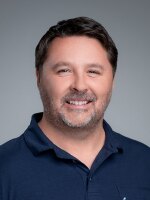San Diego's senior population continues to grow. To help prepare for the challenges of aging and expand opportunities for older residents, San Diego County has appointed its first chief geriatric officer. Dr. Lindsey Yourman’s job is to make getting older in San Diego safer, healthier and a little easier.
Yourman joined Midday Edition Thursday to talk about her new role and how she originally became interested in geriatric medicine. The interview below has been lightly edited for clarity.
It used to be that communities were okay with the idea that older people were not able to go as many places or do as many things because of their age. But that idea is changing, isn't it?
Yourman: Yes, it is changing, especially as we have more recognition that we do have ageism in our society. This way in which we act, think and talk about aging can be really negative, but we have the power to change that, and that has implications for our society having more support for mobility and all the things that we want to do as we get older.
A few years ago, the county put out what it called an aging roadmap with the goal of making the region more age friendly. What does age friendly mean in practical terms?
Yourman: To me, age friendly means having a society and infrastructure in terms of social services, medical care that takes into account the diverse and unique needs of older people.
It's interesting, as we get older, I think we become more and more different. For example, 70 year olds, you'll see a lot more diversity in people than in five year olds. But I think an age-friendly society, first of all, recognizes that there is a lot of diversity within an age group and within the older age group. And then is aware of some of the unique needs that are present as we get older, such as focusing on our goals of care, our mobility. There are certain things that become a particular concern as we get older. An age-friendly society takes that into account.
Do you think enough healthcare providers know how to treat older patients in a way that really improves their lives?
Yourman: I really don't, unfortunately. I was really astounded after I did my geriatric fellowship and I started clinical practice. I was shocked by how much of the evidence for what works for older people to improve outcomes wasn't actually being done in routine practice. And I ended up looking into this, and it's actually been studied that when you look at evidence-based care for older people and how often it is implemented, it's about 30% of the time. So we have a long way to go in terms of closing that evidence practice gap and bringing the best practice and care for older people into the mainstream.
A big issue for seniors in San Diego is the high cost of living. A study found that nearly 25% of people over 65 in San Diego live on only about $25,000 a year. And the number of seniors experiencing homelessness, I think we've learned, has increased in the county. What can be done about that?
Yourman: It's a complex situation. There's many contributing factors. But some concrete things that can be done is, first of all, trying to combat ageism in the workplace. If we can have a work culture that helps to accommodate some of the changes that some of us experience as we age, that will help with income for older people.
The other thing, of course, is affordable housing, and there is a lot of work to be done in that area. Aging and independent services within the county is working with groups such as the Office of Homeless Solutions and Planning and Development Services to provide resources and information about affordable housing programs and services to older people.
People may be surprised to learn that you yourself, Dr. Yourman, are decades away from old age. How did you develop an interest in the welfare of seniors?
Yourman: It really, for me, started with my relationship with my grandparents. I was blessed to have really wonderful grandparents and I would spend time with them, and I'd also get to know some of their friends. And I was sometimes sad that I felt like a lot of the older people that I was meeting were sometimes under appreciated or not included in society as much as would advantage all of us. And I wanted to kind of be a force for change in that way to have a more age-inclusive society.
Instead of formulating an age-friendly program from the top-down, you've said you want to hear from older San Diegans about what they need. Tell us about that.
Yourman: Well, I think that movements are generally more powerful if the people whom they affect are involved in creating them. One of the things I want to do in my job is create forums for more engagement with older people around what their biggest needs are and how we can best tackle them.
So, there's a lot of different ways in which we might do that, including making ourselves in the county accessible by email, by phone, going out into the community, to town halls, hearing people's feedback. Our aging and independent services actually on their website does have opportunities for older people to volunteer and/or be part of the age-friendly roadmap and give their input.
For more information or to provide feedback, you can also call (858) 514-3260 or email MCSDCallCenter.HHSA@sdcounty.ca.gov.







